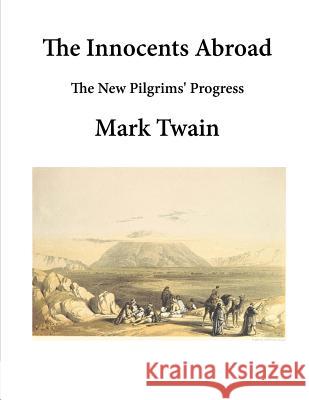The Innocents Abroad: The New Pilgrims' Progress » książka
The Innocents Abroad: The New Pilgrims' Progress
ISBN-13: 9781523295845 / Angielski / Miękka / 2016 / 234 str.
The Innocents Abroad
"The New Pilgrims' Progress"
Mark Twain
The Innocents Abroad, or The New Pilgrims' Progress is a travel book by American author Mark Twain published in 1869 which humorously chronicles what Twain called his "Great Pleasure Excursion" on board the chartered vessel Quaker City (formerly USS Quaker City) through Europe and the Holy Land with a group of American travelers in 1867. It was the best-selling of Twain's works during his lifetime, as well as being one of the best-selling travel books of all time.
This book is a record of a pleasure trip. If it were a record of a solemn scientific expedition, it would have about it that gravity, that profundity, and that impressive incomprehensibility which are so proper to works of that kind, and withal so attractive. Yet notwithstanding it is only a record of a pic-nic, it has a purpose, which is to suggest to the reader how he would be likely to see Europe and the East if he looked at them with his own eyes instead of the eyes of those who traveled in those countries before him. I make small pretense of showing anyone how he ought to look at objects of interest beyond the sea -- other books do that, and therefore, even if I were competent to do it, there is no need.
I offer no apologies for any departures from the usual style of travel-writing that may be charged against me -- for I think I have seen with impartial eyes, and I am sure I have written at least honestly, whether wisely or not.
In this volume I have used portions of letters which I wrote for the Daily Alta California, of San Francisco, the proprietors of that journal having waived their rights and given me the necessary permission. I have also inserted portions of several letters written for the New York Tribune and the New York Herald.
"The Author."
"San Francisco."
A major theme of the book, insofar as a book can have a theme when assembled and revised from the newspaper columns Twain sent back to America as the journey progressed, is that of the conflict between history and the modern world; the narrator continually encounters petty profiteering and trivializations of history as he journeys, as well as a strange emphasis placed on particular past events, and is either outraged, puzzled, or bored by the encounter. One example can be found in the sequence during which the boat has stopped at Gibraltar. On shore, the narrator encounters seemingly dozens of people intent on regaling him, and everyone else, with a bland and pointless anecdote concerning how a particular hill nearby acquired its name, heedless of the fact that the anecdote is, indeed, bland, pointless, and entirely too repetitive. Another example may be found in the discussion of the story of Abelard and Heloise, where the skeptical American deconstructs the story and comes to the conclusion that far too much fuss has been made about the two lovers. Only when the ship reaches areas of the world that do not exploit for profit or bore passers-by with inexplicable interest in their history, such as the passage dealing with the ship's time at the Canary Islands, is this attitude not found in the text.
This reaction to those who profit from the past is found, in an equivocal and unsure balance with reverence, in the section of the book that deals with the ship's company's experiences in the Holy Land. The narrator reacts here, not only to the exploitation of the past and the unreasoning (to the American eye of the time) adherence to old ways, but also to the profanation of religious history. Many of his illusions are shattered, including his discovery that the nations described in the Old Testament could easily fit inside many American states and counties, and that the "kings" of those nations might very well have ruled over fewer people .......
Zawartość książki może nie spełniać oczekiwań – reklamacje nie obejmują treści, która mogła nie być redakcyjnie ani merytorycznie opracowana.











